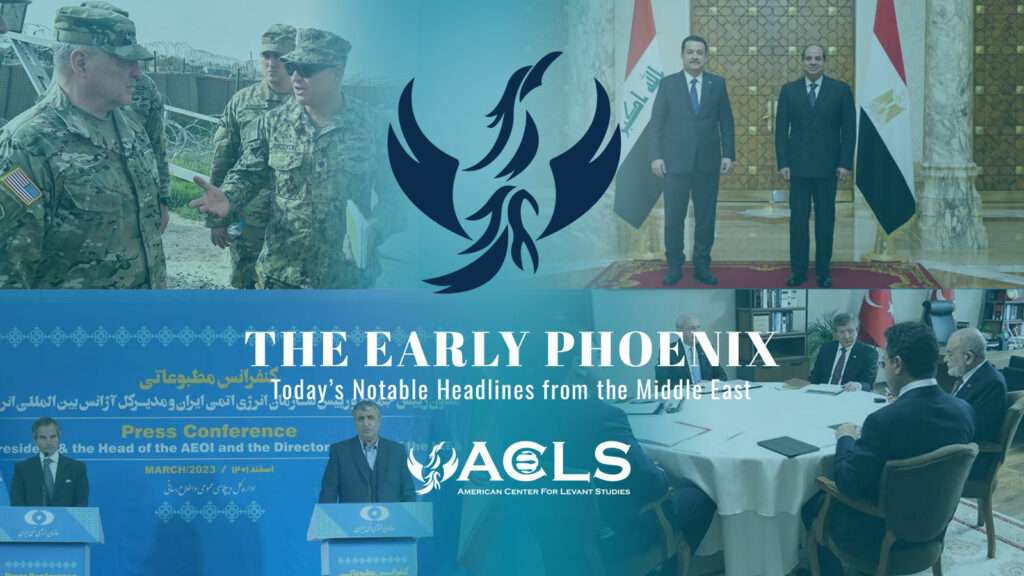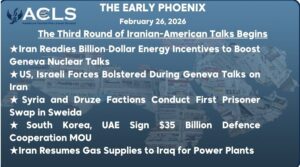THE EARLY PHOENIX
A first look at today’s most notable stories from the Middle East, selected by ACLS experts
6 March 2023
SubscribePrintable Version

IRAN
1. Iran Denies Existence of New Camera Installation Agreement, Contradicting IAEA Chief Grossi (Al Arabiya). Iran has denied that it reached an agreement with the International Atomic Energy Agency (IAEA) regarding the installation of new cameras in Iranian nuclear facilities. On Sunday, the Iranian “Mehr” news agency quoted Behrouz Kamalvandi, spokesman for the Iranian Atomic Energy Organization, stating that there was no discussion or agreement on this matter. This contradicts the joint statement issued on Saturday by the IAEA and the Iranian Atomic Energy Organization, which stated that Tehran expressed its willingness to cooperate further, provide more information and address outstanding safeguards issues.
2. Chemical Attack Against 80 Girls Schools in One Day (Iran International). Around 80 more schools were targeted by chemical attacks on Sunday, with dozens of girls hospitalized, bringing the total number of affected students to around 1,500. The attacks have been escalating since November, with hundreds of girls falling sick across Iran…The poisonings have become a daily occurrence and many, including Dr. Mohammadreza Hashemian and Nobel Peace Prize winner Shirin Ebadi, fear the attacks are being led by regime authorities.
3. Belgian Judiciary Suspends Prisoner Exchange Treaty with Iran (Asharq News). The Belgian Constitutional Court suspended a controversial Belgian-Iranian treaty, potentially blocking the transfer of a convicted Iranian diplomat, Assadullah Assadi, to Tehran. Assadi was found guilty of terrorism charges in Belgium in 2021 after planning a bomb attack on an annual gathering of the National Council of Resistance of Iran in France with the help of Iranian-Belgian accomplices. Critics of the treaty argue that it could allow for the transfer of the diplomat…The treaty was the subject of a Belgian law passed in July 2022, which opponents appealed to the Supreme Court.
4. US Senator Hagerty Calls for UN “Snapback” Mechanism to Punish Iran (Al Arabiya). Republican Senator Bill Hagerty, a member of the Senate Foreign Relations Committee, attacked the Biden administration’s policy and reluctance to punish Iran after the Iranian regime reached the nuclear threshold, even as European allies prepared to confront the Iranian regime and condemn it in the Board of Governors of the International Atomic Energy Agency…”The Biden administration refuses to join the Europeans even in blaming Iran for producing highly enriched weapons-grade uranium. We should have already started invoking the snapback and sanctioning Iran via the UN Security Council,” he said…The snapback mechanism is an agreement with the parties of the UN Security Council under the nuclear agreement, according to which all international sanctions are fully restored in the event that Iran breaches its nuclear obligations and enriches uranium to a level suitable for making nuclear weapons.
5. Iran to Build Drone Factory in Russia (Al Arabiya). Iran and Russia are reportedly increasing their military cooperation, a move that is causing concern within NATO. Five US and NATO officials have revealed that Tehran is doubling its military support to Moscow, with plans already submitted to build a drone factory inside Russia capable of producing thousands of drones annually. In addition, Russia is also set to provide Iran with military combat aircraft, helicopters, and advanced air defense systems. This burgeoning alliance between Tehran and Moscow has caused concern within NATO, particularly among European powers who are seeking to revive diplomatic negotiations over Iran’s nuclear weapons program.
6. Iranian Regime May Be Behind ‘Hit List’ Targeting Boston Jews (Jerusalem Post). The Islamic Republic of Iran is suspected to have created an anonymous website called the “Mapping Project” that aims to expose and isolate supporters of Israel by pinpointing locations of Jewish or Zionist communal spaces and organizations, as well as US security institutions, in Massachusetts. The website includes a call to dismantle and disrupt Boston’s Jewish community and a thinly veiled threat that every entity has an address and can be disrupted. The majority of the 505 targets featured on the website are US security institutions, indicating that the map might be a product of a foreign agenda, and the chief suspect is Iran.
TURKIYE
7. Five Opposition Parties Will Continue Without Akşener; Kılıçdaroğlu Will Be Announced as Candidate on Monday (BBC Turkiye). The leaders of the five political parties in the Nation Alliance have decided to proceed with their plan to announce a joint presidential candidate on Monday, March 6, despite the absence of IYI Party Chairman Meral Akşener. At a meeting hosted by Felicity Party Chairman Temel Karamollaoğlu, the leaders of the CHP, IYI Party, Saadet Party, Democratic Party, and the Liberal Democratic Party agreed to move forward without Akşener, who left the alliance recently. CHP Leader Kemal Kılıçdaroğlu is expected to be announced as the Nation Alliance’s candidate during the meeting. Meanwhile, the IYI Party will focus on developing a new election strategy.
8. Turkish Business Confederation Estimates Earthquake Cost at $84 Billion (TBS News). The Turkish Enterprise and Business Confederation has estimated that the total damage from the recent earthquakes in eastern Turkiye is around $84 billion, equivalent to approximately 10% of the country’s gross domestic product (GDP). The largest portion of this cost, $70.8 billion, is due to damage to homes, with $10.4 billion from loss of national income and $2.9 billion from loss of working days.
9. Turkey and UAE Sign Agreement to Boost Trade, Aiming to Reach $25 Billion and Create over 100,000 Jobs in 5 Years (Anadolu Agency). The UAE and Turkey signed a Comprehensive Economic Partnership Agreement to boost bilateral trade, which was hailed as a milestone and a new era of cooperation between the two countries. The agreement aims to reduce customs duties on specific products and goods by 82% to enhance intra-non-oil trade, stimulate trade and investment exchange, and establish a real development partnership…President Erdogan said that the trade volume between the two countries would reach $25 billion in five years thanks to the new deal, which would provide more job opportunities in Turkey.
10. UN Calls on International Community to Resettle Syrians in Türkiye (Daily Sabah). The United Nations has called on the international community to accelerate efforts to take in Syrian refugees from Turkiye, especially in the wake of a deadly earthquake that hit the country’s south, where a significant portion of the refugee population had been living. The earthquake on February 6 killed over 45,000 people in Turkiye and thousands more in neighboring Syria, affecting an estimated 9 million people, including over 1.7 million refugees. The UN’s International Organization for Migration and High Commissioner for Refugees expressed concern that many refugees who had fled to Turkiye in search of safety and protection were now facing the trauma of loss and displacement once again, having lost their homes and livelihoods.
GULF REGION
11. US, Saudi Arabia to Conduct First Counter-Drone Exercise Without Allies (Al Monitor). The US and Saudi Arabia are preparing to hold their first-ever counter-drone exercise, called “Red Sands,” at the end of March. The exercise will involve air defense systems owned by the US and Saudi Arabia but will not include participation from other regional militaries. However, the US intends to include additional Middle Eastern militaries in future Red Sands events in the coming months, all of which will be held in Saudi Arabia.
12. Hidden in Tomatoes and Pomegranates: Saudi Arabia Thwarts Smuggling of Two Million Captagon Tablets (Al Khaleej Online). Saudi Arabia has intercepted a shipment of two million Captagon pills at the Haditha border crossing with Jordan. The shipment was disguised as a load of tomatoes and pomegranates, but was discovered during customs procedures and security checks. Captagon is a type of amphetamine that is commonly smuggled in the Middle East and is often used by fighters in conflict zones to enhance performance and suppress fear. The seizure highlights the ongoing efforts of Saudi Arabia to combat drug trafficking in the region.
13. Saudis Offer Inducements for Major Companies to Move Their Headquarters from UAE to the Kingdom (Al Hurra). The Saudi Minister of Investment, Khalid Al-Falih, stated that multinational companies that relocate their headquarters to the Kingdom this year to secure lucrative government contracts could receive tax exemptions. Executives of these companies are concerned about being taxed in more than one place when they move their headquarters and the potential for double taxation in the absence of a tax agreement between Saudi Arabia and other Gulf states. The [program]…has caused a stir in the United Arab Emirates, which currently hosts most of the main offices of regional companies…About 80 companies, including Unilever and Siemens, have already been granted licenses to move their regional headquarters into the kingdom, many of which are expected to be based in Riyadh’s King Abdullah Financial District.
14. Iran, Oman Will Cooperate in Oil Industry (Tasnim News). Iran and Oman signed a memorandum of understanding on cooperation in the oil, refining, and petrochemical industries during a meeting between the Iranian Oil Minister and Oman’s Minister of Energy and Minerals. The agreement includes collaboration between the national oil companies of the two countries and is expected to lead to increased exports of petrochemicals and oil products from Iran to Oman.
YEMEN
15. UN Says Most of Yemen’s Relief Restrictions are in Houthi Areas (Al Sharq Al Awsat). The United Nations World Food Program has reported that most of the restrictions that hinder the work of relief organizations in Yemen are concentrated in areas controlled by the Houthi militia. The program has reduced its ability to monitor and evaluate relief aid by up to 81 percent due to the militia raiding and closing the local data company that was working for it. The report asserts that restrictions on the movement of workers in the relief field are the main type that is faced, with most of the restrictions occurring in Houthi-controlled areas.
16. Yemeni Government Warns Houthis Plan to Bring Demographic Change in Sana’a (Al Hadath). The Yemeni government has raised concerns over the Houthi militia’s plans to bring about demographic change in the capital, Sana’a, which is under its control. The Minister of Information, Muammar Al-Eryani, accused the militia of conducting military campaigns to systematically loot citizens’ lands, real estate, and farms in Sana’a, and of trying to establish a sectarian belt around the capital that owes allegiance to the regime of the Guardian Jurist in Tehran.
IRAQ
17. Baghdad Seeks to Bolster Trade with Cairo (Bas News). Iraqi Prime Minister Mohammed Shia’ al-Sudani visited Egypt on Sunday to deepen trade and security relations between the two nations. This marks al-Sudani’s first official visit to Egypt as prime minister and is part of Iraq’s broader plan to revitalize old alliances and forge new ones. The Iraqi delegation accompanying the prime minister is exploring areas where the two countries can deepen cooperation, with Iraq looking to strengthen economic partnerships with major economies in the Middle East and beyond.
18. Iraqi Prime Minister: We Reject Iranian and Turkish Aggressions (Al Arabiya). The Iraqi Prime Minister, Mohammed Shia Al-Sudani, stated that his government rejects any aggression on its borders and has taken official measures to condemn attacks by Iran and Turkey. He also noted that federal security forces are working with [the Kurdistan Regional Government] to secure the borders with these two countries. Al-Sudani stressed that any opposition to other countries from Iraq must be peaceful and unarmed, and that Iraq will not allow itself to be involved in conflicts that are contrary to its national interests.
19. Iraq Implements Controversial Alcoholic Beverages Law (Al Hurra). Iraqi customs authorities have banned the import of alcohol following the implementation of a new law that prohibits its import, manufacture, and sale. The law, which came into force recently, imposes fines ranging from 10 million to 25 million Iraqi dinars on violators. Alcohol consumption in Iraq has long been a controversial issue, with shops specializing in its sale owned by minorities such as Christians and Yazidis. The ban has been criticized by some observers as limiting freedoms and imposing penalties on non-Muslims.
EGYPT
20. Muslim Brotherhood Attempts to Rebuild Itself in Egypt (Al Hadath). The Muslim Brotherhood is attempting to rebuild itself following a government crackdown and their forced removal from power in Egypt in 2013. Imprisonment of its leaders and the escape of senior figures to foreign countries has led the group to turn to new, youthful leaders who reside in the West and hold foreign nationalities. However, rebuilding the organization involves adopting modern, liberal features consistent with human rights values and presenting as a peaceful opposition force. The Brotherhood’s success in rebranding and rebuilding itself could impact the political landscape of the region.
21. Scarcity of Foreign Currency Frightens Egyptians and Raises Questions About Feasibility of Devaluing the Pound (Al Hurra). The price of chicken in Egypt has risen to 205 pounds due to a shortage of foreign currency, causing importers to struggle to purchase fodder needed for the poultry sector…[I]t is clear that the burden of debt service Cairo must pay in 2022-2023 is about $42 billion, while exports until last October amounted to about 37 billion dollars and imports amounted to 86 billion dollars until November, creating a large deficit. This situation is caused by global price inflation, repeated declines of the pound, and a shortage of dollars with import restrictions that have delayed goods in ports.
TUNISIA
22. Tunisia Labor Union Urges President to Accept ‘Dialogue’ (Arab News). The UGTT trade union organized a rally in Tunisia on Saturday, with more than 3,000 people calling for dialogue and an end to impoverishment. The protest also condemned the recent crackdown by the government, which has arrested around 20 prominent political figures, primarily opponents of President Kais Saied. UGTT chief Noureddine Taboubi accused the government of targeting the union and criticized the imprisonment of Anis Kaabi, a top UGTT official, who had been detained after a strike by toll barrier employees. Saied has pushed through sweeping changes to the political system in Tunisia.
SYRIA
23. US General Milley Makes Unannounced Visit to Syria, Reviews Mission (Al Arabiya English). Army General Mark Milley, the top US military officer, made a surprise visit to a US base in Syria on Sunday to evaluate the mission to combat ISIS and ensure safeguards for US troops against attack. Milley expressed his belief that progress was being made by US troops and their Kurdish-led Syrian partners in achieving a lasting defeat of ISIS.
24. $5.1 Billion in Earthquake Damage in Syria (Al Hadath). The World Bank estimates that the recent 7.8-magnitude earthquake and aftershocks in northern Syria caused damages of $5.1 billion, equivalent to 10% of the country’s GDP. The affected region includes 4 governorates with 10 million people, including many internally displaced persons. The death toll in Syria has risen to nearly 6,000, and the earthquake also killed over 45,000 people in Turkey.
25. Switzerland Eases Sanctions on Syrian Regime to Facilitate Aid Delivery (Syria TV). Switzerland has eased some of its sanctions against the Syrian regime to facilitate the delivery of humanitarian aid following the recent earthquake that struck Turkey and northwestern Syria. The move was announced by the Federal Council, which stated that Switzerland had sent aid to the earthquake zones including doctors, engineers, tents, and hygiene items. Meanwhile, Bashar al-Assad, the head of the Syrian regime, is seeking to achieve political gains from the earthquake and is pressing for humanitarian aid to be sent to his regions to ease international isolation.
ISRAEL
26. Israeli-American Talks as Iranian Nuclear Capabilities Approach “Red Line” (Al Sharq Al Awsat). In response to Iran’s recent progress in enriching uranium, Israel and the US will begin deliberations to address the issue. A delegation from Israel, including Strategic Affairs Minister Ron Dermer and National Security Council Chairman Tzachi Hanegbi, will travel to Washington next week to meet with officials from the White House, the Pentagon, and the State Department. The Israeli delegation will meet with White House National Security Adviser Jake Sullivan, Secretary of State Anthony Blinken, and other senior US officials. This will be followed by US Secretary of Defense Lloyd Austin’s visit to Israel. The main focus of these meetings will be on the Iranian nuclear program and how the US and Israel can partner to confront it. Other issues such as joint cooperation, regional conditions, and the situation in the Palestinian arena will also be discussed.



